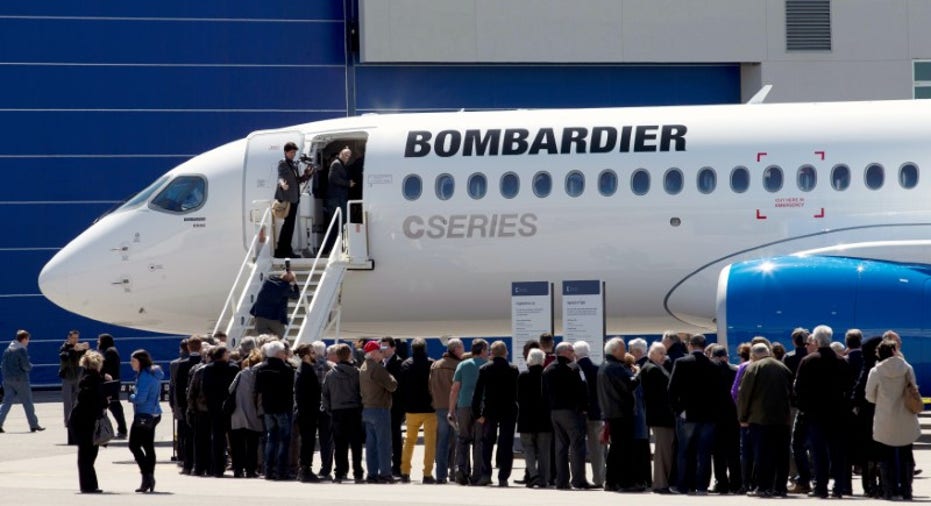Brazil challenges Canada at WTO over Bombardier funding

SAO PAULO/BRASILIA – Brazil opened a formal complaint against Canada at the World Trade Organization (WTO) on Wednesday, accusing the country of distorting the global aerospace industry with subsidies for planemaker Bombardier Inc .
Brazil has threatened for months to open the WTO dispute, arguing that support for Bombardier's new CSeries was undercutting the market for commercial jets made by Brazilian rival Embraer SA .
The case builds on decades of antagonism between the two regional jet makers and echoes arguments in the world's largest trade dispute, a transatlantic spat over government support for Boeing Co and Airbus Group SE .
Brazil's action came on the heels of fresh support for Bombardier on Tuesday in the form of interest-free loans worth C$373 million ($283 million) from the Canadian government. Canada's Trade Minister Francois-Philippe Champagne said the loans complied with WTO rules and the government would defend itself against litigation.
Brazil's Foreign Ministry criticized "at least $2.5 billion in government support" for the Canadian planemaker last year and a senior official said the complaint would include the loans announced on Tuesday.
"It is the understanding of Brazil that these Canadian subsidies artificially affect international competitiveness," the ministry said in a statement.
The province of Quebec, where Bombardier is based, injected $1 billion into the company's CSeries program last year. The province's largest pension fund also invested $1.5 billion in the company's rail unit.
Embraer Chief Executive Officer Paulo Cesar Silva said in a statement that the ongoing cash injections "have not only been fundamental in the development and survival of the CSeries program, but have also allowed Bombardier to offer its aircraft at artificially low prices."
STEEP DELTA DISCOUNT
Last year, Bombardier scored an order from Delta Air Lines Inc for 75 CSeries jets, worth some $5.6 billion at list prices, beating out Embraer's competing E-Jets with below break-even prices, according to the Brazilians.
Two sources familiar with the deal said Bombardier offered a roughly two-thirds discount to win the order, its biggest to date for the fledgling CSeries program.
Bombardier booked a $500 million "onerous contract" charge related to that Delta order and a separate deal with Air Canada .
Carlos Cozendey, undersecretary for economic affairs at Brazil's Foreign Ministry, said that subsidies had been key in helping Bombardier win the Delta contract and could influence more sales campaigns this year.
Bombardier pushed back on Wednesday, calling the government support a standard practice in the global aerospace industry.
"All forms of support provided to Bombardier, including the repayable program contributions announced by the federal government yesterday and the investment from the Quebec government... are fully compliant with Canada's international trade obligations," Bombardier said in a statement.
The company compared that funding to loans for Embraer from Brazil's state development bank BNDES and an investment by the Brazilian Air Force in Embraer's new military cargo jet.
"The aerospace industry is heavily subsidized around the world," said lawyer Renata Amaral, head of the international trade practice at Brazilian firm Barral M Jorge & Associates. "The problem is when subsidies reach a degree that starts creating distortions in the market."
Amaral, who has advised Brazil on previous WTO cases, said that a decision on the current dispute was likely to stretch into 2018.
Both countries now have up to 60 days to try to settle the dispute before the WTO convenes a panel of experts to help make a ruling in the case.
BUILDING ON PRECEDENT
The latest WTO standoff follows nearly a decade of sparring between Brazil and Canada over state financing for Embraer and Bombardier's exports in the 1990s.
However, the current dispute is closer in substance to the clash between the United States and the European Union over allegedly unfair support for Boeing and Airbus.
Brazil will aim to build on a partial U.S. victory in that case, which focused on comparing public financing for aircraft development with private-sector benchmarks to determine whether the loans constituted improper subsidies.
The WTO ruled that loans to Airbus were unfair but stopped short of putting them in the worst category of "prohibited" aid. The dispute, which started more than a decade ago, has still not completed a lengthy WTO compliance process.
Cozendey, of Brazil's foreign ministry, said that precedent strengthened the argument against Canadian subsidies.
Brazil will argue that some of Canada's measures are "prohibited" under international trade law, while others are not illegal per se but are "actionable" because the scale of the subsidies are disrupting competition, Cozendey said.
(Reporting by Brad Haynes in Sao Paulo and Alonso Soto in Brasilia; Additional reporting by Allison Lampert in Montreal and Tim Hepher in Paris; Editing by Daniel Flynn, Nick Zieminski and Lisa Shumaker)



















